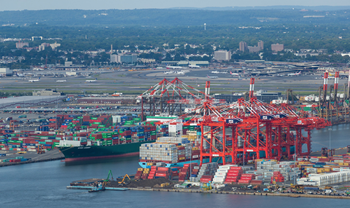 “COVID, perhaps more than any other event in recent memory, has highlighted just how important it is that we have resilient, diverse and secure supply chains,” Monica Gorman, Deputy Assistant Secretary Manufacturing Industry and Analysis at the International Trade Administration of the U.S. Department of Commerce, told the NJTPA Board at its September 13 meeting.
“COVID, perhaps more than any other event in recent memory, has highlighted just how important it is that we have resilient, diverse and secure supply chains,” Monica Gorman, Deputy Assistant Secretary Manufacturing Industry and Analysis at the International Trade Administration of the U.S. Department of Commerce, told the NJTPA Board at its September 13 meeting.
Gorman provided highlights from reports compiled in response to an executive order issued by President Biden in February. The order mandated analyses of critical aspects of the supply chain.
The reports call for investing in and strengthening the domestic manufacturing base; continuing and strengthening leadership in innovation and research and development; investing in the workforce; ensuring economic opportunity is available to all people across the country; and building a diverse ecosystem of suppliers, she said.
She said the Department of Commerce led the report on semiconductors, which play a critical role in transportation. For example, she said, a new car requires more than 100 semiconductors.
“Semiconductors enable telecommunications and grid infrastructure, they run our critical businesses, our transportation systems, our government systems, and they’re prevalent across a vast array of products from refrigerators to fighter jets,” she said.
Yet the United States’ share of global semiconductor production has fallen from 37 percent in 1990 to 12 percent this year, and she said that is expected to drop further without a comprehensive strategy for supporting the industry. The report calls for providing dedicated investment and funding for semiconductor manufacturing and research and development to support domestic production.
Acknowledging that not everything can be made domestically, she said the United States must also create geographic diversity among its supply chain.
Gorman also spoke about the need to support the Port of New York and New Jersey, which she called “a critical gateway for the supply chains that underpin American manufacturing.”
She said the Department of Commerce is aware of the many challenges the Port is facing including congestion, increased dwell times, equipment and storage shortages, and container shipping rates, while also experiencing near record cargo volumes. She noted the recent appointment of John Porcari as Port Envoy to the federal Supply Chain Disruption Task Force, where he will focus on addressing port congestion.
Gorman said she’s also hopeful the bipartisan federal infrastructure bill will help address issues at the ports and across the transportation sector. The U.S. Senate passed the bill in August, but it still must pass in the U.S. House of Representatives.
“It is truly a once in a generation opportunity to transform our infrastructure, including investing billions to improve our ports and waterways. The funding would help address congestion and supply chains over time by investing in the repair and maintenance needed to reduce congestion and emissions at the ports,” she said.
The bill also includes funding for New Jersey roads and bridges, NJ TRANSIT and for a new trans-Hudson rail tunnel, she added.
“The bipartisan infrastructure bill represents a historic investment in our country that will strengthen our economy to benefit our country and New Jerseyans for decades to come,” she said. Visit our YouTube channel to view the full presentation.